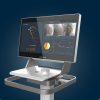In our work partnering with U.S. medtech companies in Ireland, we engage with a forward-looking microcosm of top American medtech firms that are already preparing for the next decade.
With its pro-business environment, investment and R&D supports, active research sector and access to international talent, Ireland has created a strong ecosystem for medtech that encourages the development of new technologies and innovations that benefit Irish-based businesses throughout their global business operations. With 14 of the world’s 15 top medtech companies located in Ireland, the following are some of the latest trends and focus for the industry from 2020 and beyond.
Digitization Is Paramount
The trend toward innovation via technology is unstoppable, whether in products, devices or manufacturing operations. The pace of this digital evolution is increasing and medtech will see more convergence in the tech space as various technologies—devices, sensors, data and connectivity—are combined to become a key business enabler. The Internet of Things (IoT) and Industry 4.0 concepts that are already impacting other industries such as automotive will be critical in the medtech industry.
Given the breadth of the medtech industry in Ireland, we are seeing a strong appetite for investment in smart manufacturing practices, ensuring site competitiveness on a global scale through optimized performance, yield maximization, reduced waste and upskilled talent pools.
Digital journeys aren’t a one-size-fits-all, and we’ve seen clients take different paths when faced with a fork in the road. Some examples in the space include DePuy Synthes, whose Cork facility was recently ranked by the World Economic Forum among the best in class globally for its use of IoT technologies in-house.
Others find that they would like to dip their toe in the digital pool before taking it in-house. In response, IDA Ireland is working in collaboration with local stakeholders to build out an Advanced Manufacturing Centre in Limerick to provide a soft landing for companies as they upskill and test out the most appropriate digital technologies and practices for their sites.
Technologies and Partnerships
Given the high volume of data generated in the medtech industry, it’s not surprising that tech companies outside the life sciences arena are partnering with medtech firms and/or developing their own life sciences offerings. The infrastructure and expertise of large tech companies in areas like artificial intelligence, machine learning, analytics and big data can bring huge benefits to device makers as they build connected devices and patient-focused solutions for the future.
Nine of the world’s top 10 technology firms have set up shop in Ireland, which has helped create a resource-rich ecosystem for R&D and collaboration between these tech leaders and medtech companies. Ireland has historically attributed much of its success to its fostering of partnerships across government bodies, academia, industry and international partners. We actively support, encourage and foster collaboration between companies. For example, in 2018, Ireland launched a €500 million Disruptive Innovation Technologies fund to support B2B collaboration.

With a thriving multinational tech and life sciences community and a vibrant indigenous digital health community, we see great potential for collaboration and partnerships into the future. These partnerships will be boosted by the proximity of Ireland’s life sciences and tech communities along with academics and research centers, clustered on a small island.
A great example is Stryker, which recently announced the opening of its Digital Platform Services Centre of Excellence in Ireland, along with a strategic collaboration with Royal College of Surgeons Ireland in developing digital solutions for use in emergency and specialist care settings.
Breakthroughs in Device Manufacturing
Besides the advances inherent in IoT, medtech manufacturing plants will increasingly pursue new areas such as 3-D printing in the realm of additive technologies that will impact the industry. 3-D printing enables both devices to be tailored for patients as well as mass customization, and it is rapidly creating disruption and new opportunities across the supply chain. Given Ireland’s heritage in manufacturing and our commitment to producing graduates skilled in the latest methodologies, Science Foundation Ireland established the I-Form Research Centre, which is focused on enhancing the manufacturability of components and products using 3-D printing techniques. DePuy Synthes has based a 3-D Printing Centre of Excellence in Cork, and Stryker’s additive manufacturing site in Cork is the largest 3-D printing center of its type in the world.
Need for Greater Security
The expansion of connected, data-rich medtech devices is putting cybersecurity at the forefront, with built-in security required to be a core element of device development. This security focus will only increase in 2020 and beyond, supported by development in new areas such as blockchain, which is cryptographic technology that helps protect sensitive information. Medtech companies should be identifying and tapping into government and private blockchain and cybersecurity programs in order to understand how these developments can be incorporated into products. Companies with Irish operations can exploit well-funded initiatives around blockchain. Cyber Ireland also offers an excellent platform for companies to engage and work together, where 90 companies including cyber, tech and other industries, government agencies and academic institutions are participating to make Ireland a global cybersecurity leader.
Advances in Global Business Services
With ongoing M&A and companies continuing to internationalize at pace, the need for highly skilled services operations to support the growing business continues. Ireland built a solid reputation over the past two decades for companies seeking well-educated talent for centralized business centers. In time, those centers have greatly evolved in sophistication and mandates, and are now the focus of companies seeking to bring together high-end commercial, technical, digital and clinical support for their international operations into one central hub. The economies of scale are important, but the access to a deep and wide international talent and language pool has made Ireland the go-to Centre of Excellence for more than 140 global business services centers, including many in life sciences. Most recently, San Diego-based rapid diagnostics company Quidel announced a 75-person International Services Centre in Galway.
Addressing the Talent Challenge
One of the biggest issues for U.S. medtech companies is finding the right supply of skilled workers from engineering to researchers needed to develop, manufacture and support world-class devices. A proven approach to this problem is accessing government-supported programs that work in concert with industry to produce qualified employees. The ongoing need for skilled workers is what has led many U.S. medtech companies to set up R&D, manufacturing, services and other facilities to Ireland.
Ireland’s long history of working with multinationals coupled with access to the wider EU talent pool is a key element attracting U.S. medtech companies. Besides the high percentage of STEM graduates from universities, U.S. companies find the Irish ecosystem’s agility in recognizing and quickly addressing gaps in the market particularly impressive. A shortage of top-tier talent in bioprocessing was recognized and IDA, in collaboration with academia, founded the National Institute for Bioprocessing Research & Training (NIBRT), which trains up to 1,500 professionals annually in the latest modalities of biologics manufacturing.
Similarly, the Centre for Research in Medical Devices (CÚRAM) develops innovative, implantable “smart” medical devices. CÚRAM offers companies the ability to have clinical collaborations with industry partners and hospital groups, enabling rapid translation to the clinic.
Technology Driving Personalized Care
The next decade will see continued breakthroughs in technology that will directly impact patient care. There will be a bigger drive toward personalized care with greater patient engagement empowered by all the data increasingly being gathered through medical smart devices and wearables. Indeed, the connected health era will prevail as populations age and care providers and payors require more evidence around clinical outcomes and impact. We expect to see smart sensors applied to more devices and increased levels of virtual care and remote monitoring.
The digital revolution will increasingly impact supply chains and manufacturing operations, and medtech companies will continue to evolve towards becoming solutions providers. Fueled by expanding technology and innovation, the medtech industry will be able to expand its efficient, effective involvement in the patient lifecycle with new offerings in the patient post-treatment area. Whether through in-house development or in partnership with other companies and institutions, the watchword of the next decade will be innovating, collaborating and deploying advanced technology to improve human health to levels never seen before.







